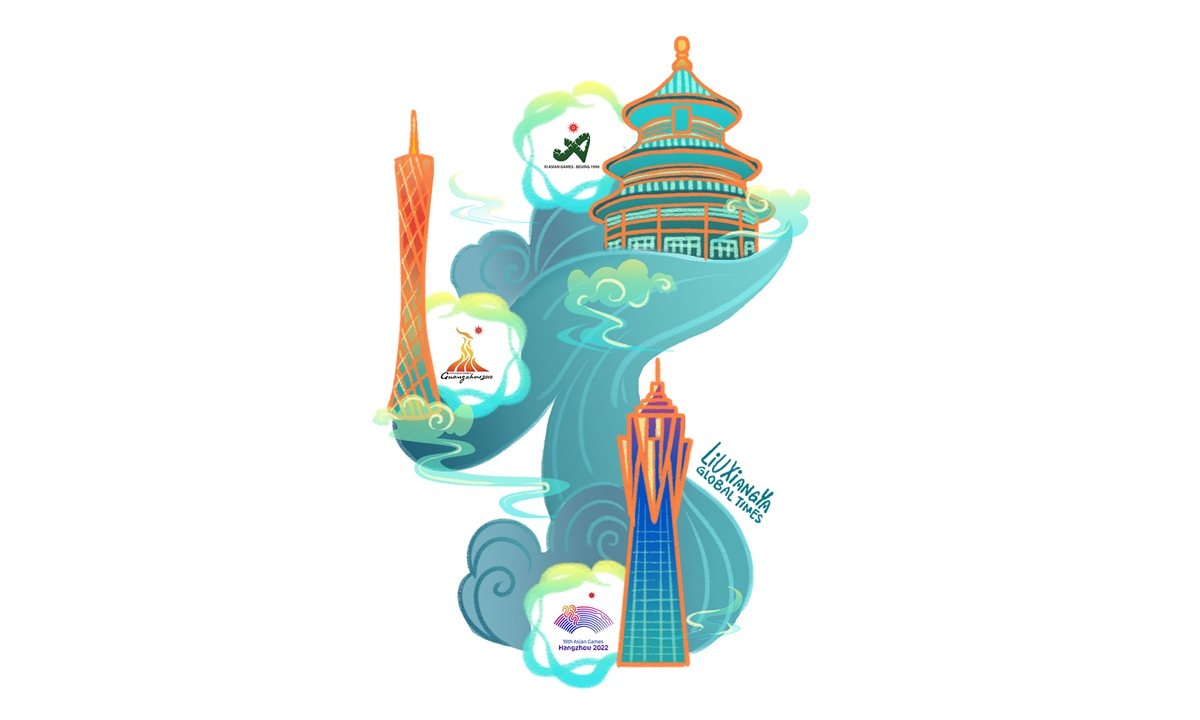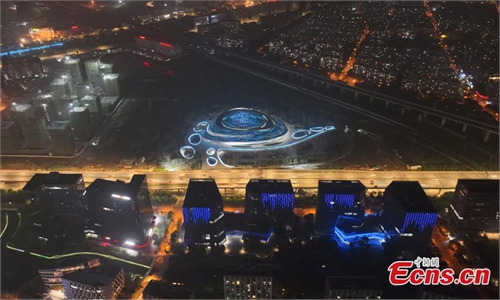ARTS / ART
Three Asiads witness huge changes in cities and country

Illustration: Liu Xiangya/Global Times
The lyrics of the song "Asian Mighty Winds" often echo in my mind whenever I recall the Beijing Asian Games held 33 years ago. Recently, this song was sung again by some students to celebrate the upcoming Hangzhou Asian Games set for September. Hearing it made me very emotional and brought me back to 1990, the year China held its first comprehensive international sports event.The Asian Games in 1990 were the first international sports meet in the country's history and a milestone for international exchanges since China's reform and opening-up. Beijing residents witnessed the ancient city starting to turn into a metropolis and China embarking on fast modernization.
Starting in 1986, large-scale construction began across the city. A big area in the capital's north, which used to be farms, was allocated to build the Asian Games facilities. After four years, 20 new stadiums as well as 13 renovated venues and 16 athlete apartments were completed. In addition, a five-star hotel, an international conference center and a big shopping center were also put up, making the area one of the trendiest places in the city at the time.
When I visited that area, it seemed that a new town had suddenly appeared. Urban highways around the city were also finished before the games. In order to improve the roads in the city, a street in east Beijing's Chaoyangmen area, which used to be narrow and crowded, was expanded. When I happened to pass through that street, I was shocked to see that it had been turned into a broad boulevard with convenient transportation. In this sense, the Asian Games in Beijing really helped boost the urban environment and benefit residents.
However, the Games also posed a big challenge for the city and the entire country in terms of costs.
Since the Chinese government did not have enough funds for the Asian Games at that time, it called on people throughout the country to donate money on a voluntary basis. At a time when the average monthly income of ordinary Chinese was less than 200 yuan, some older Beijing residents donated their savings in small notes and some schoolchildren even gave out their pocket change in coins. Finally, a total of 270 million yuan was collected. It proves the saying that "more hands make light work," a perfect example of Chinese people's willing contribution to this national pursuit.
Altogether 6,578 athletes from 37 countries and regions participated in the event 1990. China dispatched 636 athletes who attended all 27 events and two performing events.
What made me feel proud was that for the first time in history, China ranked first in the number of medals, especially gold medals, accounting for three-fifths of the total; breaking one world record and 30 Asian records. This breakthrough was of real significance because it established China as a sports powerhouse in Asia.
The biggest legacy of the 1990 Games was the foundation it laid for the Olympics in 2008. When planning the construction of the Asian sports facilities, a desire to host the world's biggest multi-sport event sprouted.
Apart from showing a new image of Beijing and the fighting spirit of Chinese athletes, the Beijing Asian Games were also the first time that China had drawn such a big crowd of foreigners after its reform and opening-up.
The mascot Panpan, a cute and adorable panda, became a household name at that time. It signified Chinese people's sincere wishes for peace, friendship, and China opened its arms to friends from all over the world.
With the good experience of the Beijing Asian Games, the Guangzhou Asian Games were held in 2010. More than 12,000 athletes from 45 countries and regions participated in 42 competitive events, the most in Asian Games history. The 2010 Games also saw the construction of many new landmark buildings such as the Canton Tower by the Pearl River.
In the upcoming Asian Games, there will be 40 sports that include many new ones such as the esports competitions. Residents in Hangzhou, just like those in Beijing, are enjoying the improvements in the city's infrastructure.
Over the past 33 years, if the Beijing Games showed a rising China, then the Guangzhou Games were a testament to China's achievements in reform and opening-up, and the Hangzhou Games will demonstrate China is firmly marching along its path to modernization.
The author is an editor with the Global Times. life@globaltimes.com.cn


